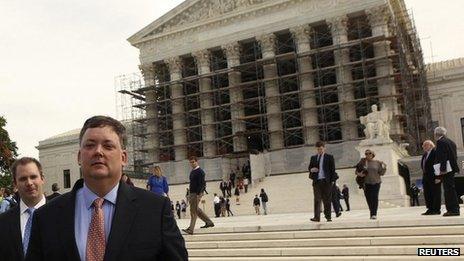McCutcheon case: US court weighs campaign finance limits
- Published

Republican donor Shaun McCutcheon filed the suit because he wanted to give more money to more candidates than allowed by current law
The US Supreme Court has heard arguments in a case that could further expand the amount of wealthy donors' money in the US political system.
A Republican donor is challenging a legal limit on total political contributions in an election cycle.
Proponents of the law argue overturning it would unfairly increase wealthy individuals' influence in politics.
The arguments come three years after the court loosened strictures on corporate spending in elections.
Contribution limits were established by Congress in the 1970s in an attempt to restore the public's faith in government after President Richard Nixon's resignation in the Watergate scandal.
At issue in the case argued on Tuesday, McCutcheon v Federal Election Commission, is the total amount of money a single individual can give to candidates across the country in a given two-year election cycle.
'How you choose'
A $2.5bn election: Where the money comes from
The plaintiff is Republican Shaun McCutcheon, owner of the Coalmont Electrical Development Corporation in Alabama.
In the 2011-12 election cycle he gave $1,776 (£1,100) each to 15 candidates for Congress.
He wanted to give the same amount to 12 other candidates, but was blocked by the federal limit on overall individual contributions, which is tied to inflation and will be $123,200 for 2013-14.
"It's a very important case about your right to spend your money how you choose," Mr McCutcheon has said.
He told the Associated Press he planned to spend several hundred thousand dollars in this election cycle between candidates and outside political groups.
Solicitor General Donald Verrilli Jr, who argued in favour of the limit on behalf of the Obama administration, told the court on Tuesday that if the limit were overturned, donors "could potentially funnel massive amounts of money to a favoured candidate".
A controversial high court ruling in 2010, known as Citizens United v Federal Election Commission, loosened restrictions on political spending by nominally independent groups known as political action committees.
While those groups are barred from directly co-ordinating with candidates' campaigns, they may spend large amounts of money promoting a candidate or running negative adverts again the candidate's opponents. They are funded by business interests, wealthy individuals and, to a lesser extent, labour unions.
The McCutcheon case does not directly challenge limits on the amount an individual can give to a single candidate.
But groups that favour strict limits on the amount of money in politics say a broad ruling by the court overturning the limits would threaten the integrity of US elections.
"This is not about some abstract concept," said Fred Wertheimer, president of campaign finance reform group Democracy 21.
"It's about re-establishing a system where huge contributions can be given directly to benefit candidates and parties, and it will create opportunities for the corruption of governmental decisions."
Middle ground
Mr Verrilli argued on Tuesday that without the aggregate limits, one donor giving the maximum allowed to every congressional candidate, political party and political action committee would exceed $3m in contributions in a single election cycle.
Only a small portion of all current donors to political campaigns would be affected by a removal of the aggregate limit, should the Supreme Court rule in favour of Mr McCutcheon.
According to the Center for Responsive Politics, 646 people in the 2012 election cycle hit the maximum overall donation limit.
Those people gave more than $93m directly to candidates and committees.
During arguments, the nine justices seemed closely divided.
Chief Justice John Roberts, who was in the majority in the 2010 Citizens United case, appeared to be looking for middle ground that would allow individual donors to give to more candidates without opening the door to multi-million dollar direct contributions, analysts said.
- Published1 November 2012
- Published8 October 2013
- Published25 June 2012